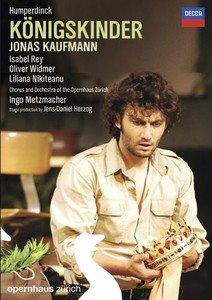|
|
|
|
|
|
|
|
|
Opera UK, May 2013 |
| George Hall |
|
|
|
Königskinder, Humperdinck |
|
|
 Humperdinck's
second most successful opera had a splashy and highly successful launch at
the New York Met in 1910, garnering 39 performances there up to 1914, and
quickly appeared at Covent Garden, with five performances between 1911 and
1913; neither house, however, has thus far returned to it. An earlier
version of the piece (1897), which began as a melodrama, had already been
widely performed. The opera itself, to a libretto derived from the play by
Elsa BernsteinPorges (writing under the pseudonym Ernst Rosmer), is a
made-up fairy tale, placing the piece firmly inside the Märchenoper
tradition. After Konigskinder had done the international rounds, it largely
disappeared, though revivals in recent decades (including an important ENO
staging in 1992 and one in Munich in 2005) seem to be becoming more and more
regular. The piece makes its first appearance on DVD in a 2010 Zurich
staging that proves, as a whole, highly recommendable. Humperdinck's
second most successful opera had a splashy and highly successful launch at
the New York Met in 1910, garnering 39 performances there up to 1914, and
quickly appeared at Covent Garden, with five performances between 1911 and
1913; neither house, however, has thus far returned to it. An earlier
version of the piece (1897), which began as a melodrama, had already been
widely performed. The opera itself, to a libretto derived from the play by
Elsa BernsteinPorges (writing under the pseudonym Ernst Rosmer), is a
made-up fairy tale, placing the piece firmly inside the Märchenoper
tradition. After Konigskinder had done the international rounds, it largely
disappeared, though revivals in recent decades (including an important ENO
staging in 1992 and one in Munich in 2005) seem to be becoming more and more
regular. The piece makes its first appearance on DVD in a 2010 Zurich
staging that proves, as a whole, highly recommendable.
Humperdinck's
score is hard to fault, unless one finds the last act a little on the long
side. But the composer was a master of his relatively conservative idiom,
behind which lies Wagner in general and Parsifal in particular. An
infinitely darker piece than Hansel and Gretel (which at least has a 'happy'
ending), Konigskinder is superbly composed throughout.
It is arguably
more problematic as a drama, partly because the geese initially attending
the central character of the Goose-Girl are never going to be easy to
realize on stage (Zurich makes do with two-dimensional white cut-outs, each
with its own handle), but also because it's hard to comprehend exactly what
Porges meant by the notion of kingship—presumably some sort of spiritual
superiority, innate rather than necessarily inherited. Whatever is intended,
the couple's brutal rejection by the gruesome inhabitants of the town of
Hellabrunn (with the notable exception of the children, and the mysterious
Fiddler) forces them towards Parsifal-like wanderings and ultimately death,
when, starving, they eat the poisoned loaf earlier baked by the Goose-Girl
at the behest of the Witch—who has in the meantime been burned. It must be
one of the most downbeat endings of any late-Romantic opera—which is saying
something.
Enigmatic or not, the piece exerts a tangible fascination,
though the Zurich staging moves it beyond the orbit of fairy-tale imagery
into something more familiar, if less coherent. The Witch, a teacher who
grows and sells cannabis, is raided at the beginning of the second act,
which follows straight on from the first. The unit set then apparently turns
into a village hall, where the Innkeeper plies his dishonest trade, and
which is semi-ruined in Act 3, when the King's Son and the Goose-Girl return
to it to die. Devoid of much of the traditional apparatus, the production is
nevertheless convincingly acted by the entire cast.
Musically, too,
this is a superior performance, with excellent orchestral playing and the
conductor Ingo Metzmacher maintaining momentum as he highlights the score's
many beauties. Reviewing the production for the Financial Times in
2007, Shirley Apthorp described Jonas Kaufmann as 'the fairytale prince of
most opera-goers' dreams', and one can only concur; it is hard to imagine
the role better sung or acted. But Isabel Rey is almost equally
impressive as the Goose-Girl, while Liliana Nikiteanu presents a splendidly
fearsome Witch, and Oliver Widmer an aptly dour Fiddler; the numerous
smaller roles are all finely taken. Since this is the only currently
available DVD, there are no alternatives to compare, but the virtues of this
version are in any case self-evident.
|
|
|
|
|
|
|
|
|
|
|
|
|
|
|
|
|
|
|